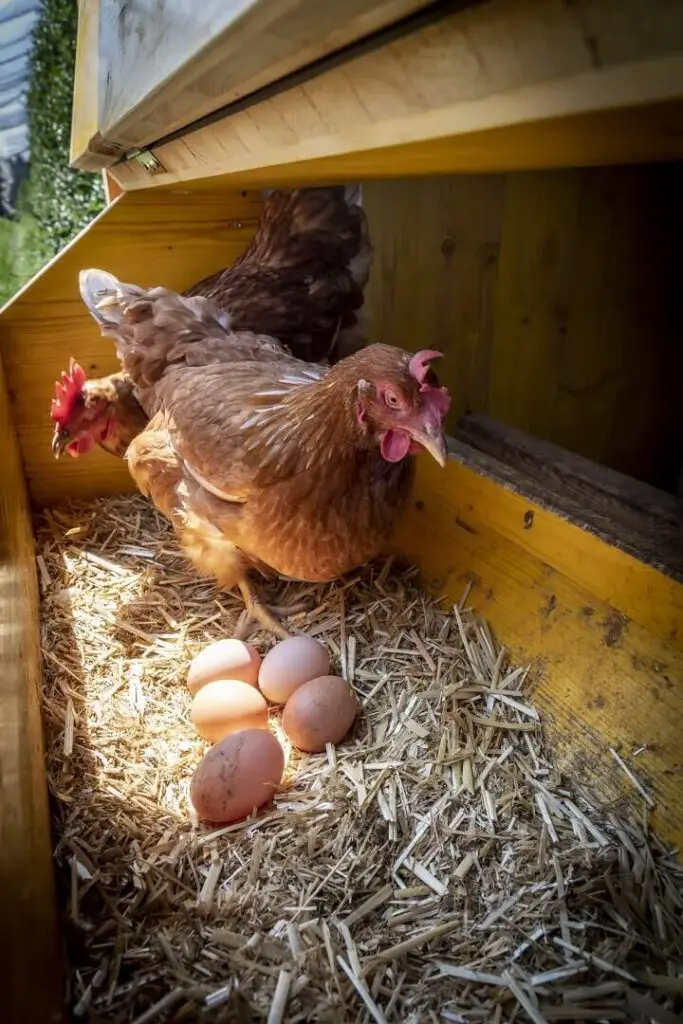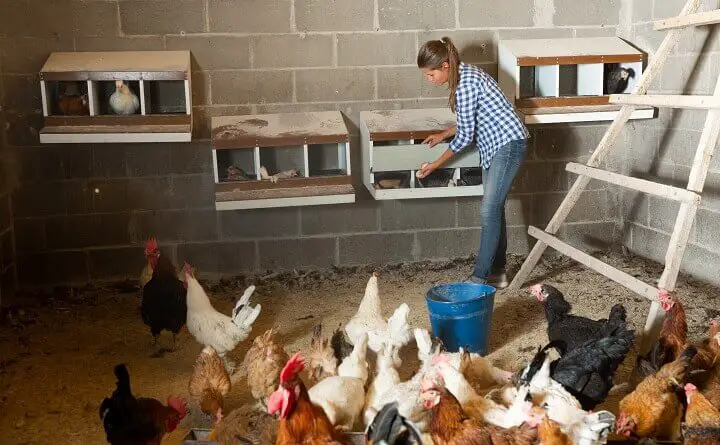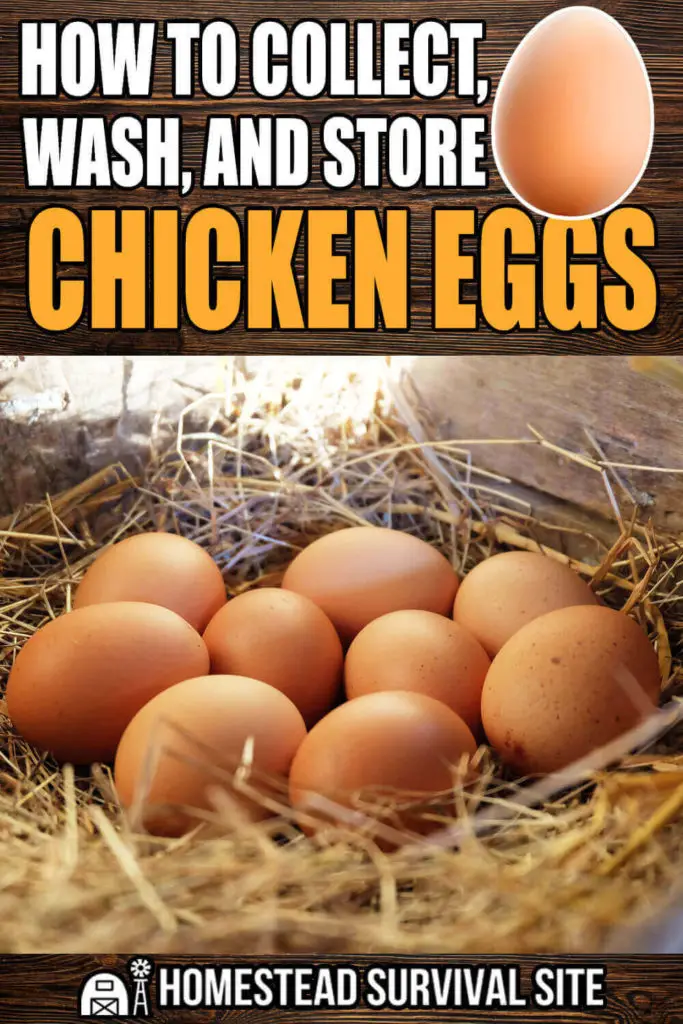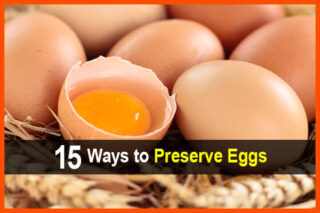Estimated reading time: 10 minutes
The eggs you collect from your chickens are a little bit different from the eggs you get at the store. After they are collected, store-bought eggs are sized, cleaned, and washed. Then they're packaged and kept cold.
When it comes to collecting your own eggs, you want to make sure your eggs are as healthy and clean as store-bought eggs, but the process is slightly different. Here's what you need to know to collect, wash, and store chicken eggs.
Want to save this post for later? Click Here to Pin It On Pinterest!
Start with Clean Eggs
First and foremost, you need to start with eggs that are as clean as possible. That means a clean chicken coop, a mud-free run, and fresh nesting boxes.
If your chickens are walking through mud and dirt on their way to the nest box, they may get mud all over the eggs. You may not be able to prevent this, but if possible, plant extra grass, put down mulch, or use sand to keep your run from getting too muddy.
Ideally, you should clean out your chicken coop once a week. Scoop out and dispose of any soiled bedding and replace it. Put fresh straw or wood shavings into the nest boxes as often as needed. The cleaner the nest boxes, the cleaner your eggs will be. If you prefer the deep litter method of chicken bedding, that's fine too. Just make sure to top off the straw often.
Nest boxes don't have to be fancy, they just need to be the right size, and they need to be clean. Some people use litter pans, dishpans, 5-gallon buckets set on their side, shelving, or commercially made nest boxes. Whatever you prefer will work just fine for your hens.
Keep the nest boxes full of fresh straw. If you can, take some time to watch your chickens' egg-laying behaviors. If your rooster is a proper gentleman, he will show his ladies the best nest boxes to lay in. Don't be surprised if there is a little squabbling going on! The hens often want to lay their eggs in the same space. It gets comical when they try to lay their eggs in the same spot at the same time.
Most of the time, chickens will lay their eggs in the morning, or at least it seems that way. Since it takes 24 to 28 hours for a hen to produce an egg, it technically could happen at any time of day.
Your hens might just let you know when an egg has arrived because they'll sing the egg song! You'll hear a bit of cackling and squawking that will echo throughout the flock. By late morning, the activity will likely have calmed down, and you'll know it's an excellent time to collect the eggs.

When to Collect Eggs
If your weather is mild and your coop is well-secured, you are probably safe to just collect your eggs once per day. Generally speaking, the best time to collect eggs is just after lunch. If most of your hens are laying their eggs in the morning, then you'll be able to get most of the eggs around lunchtime.
If you have exceptionally warm or cold weather, you might want to gather your eggs two or three times a day.
If you gather your eggs for a second time, do that in the evening. Gathering eggs right around dusk will help keep the eggs fresh by preventing them from freezing in the cold weather overnight or getting too hot in the warm weather. It will reduce the chances of your hens going broody, and it will reduce the attraction of predators who like to eat the eggs in your coop!
You can always do a last-minute check for eggs in the evening when you lock up your chickens and gather up any late eggs.
How to Collect Eggs
Collecting eggs is the easy part! You need something safe to put your eggs in while you collect them. This container could be an egg basket, an egg apron, a bucket, or anything else that won't jostle them around too much. Try to avoid hiding eggs in your pockets because if you forget, you're likely to find a wet, squishy surprise later!
If you feed your hens right before you collect eggs, they'll be busy snacking and will be much less likely to get underfoot. It's a great time to give them any table scraps, leftovers, or special treats. They'll get used to your presence and learn to come running when its treat time!
Egg collecting is pretty simple – just reach into your nest box and gently snag the eggs. Be careful that you don't just drop them into your bucket because they'll crack. Set them in gently and try to avoid letting them roll around or bang into each other.
If you have a broody hen or two, she will probably gather up any eggs she can find and sit on them. You can still take the eggs from her, but it might require a little bit of finesse!
Taking Eggs from a Broody Hen
Broody hens can get a little bit grumpy and possessive of their hard-won eggs. They certainly don't want to give them up to be your breakfast. You might need to wear long sleeves and gloves to avoid a nasty nip on the arm. But if your broody isn't too irritable, you can reach underneath her and sneak out the eggs. She might growl and complain, but that's ok!
If she is challenging, you might gently pick her up and stick her under your arm, so she feels safe and secure. Then you can pick up all the eggs she was hiding without worrying about her pecking your fingers.
What to Do When the Eggs Are Missing
If you can't seem to find your hens' eggs, they may be laying them somewhere other than the coop. Look around for areas where your hens like to hang out. You might find a little stash of eggs somewhere. Likely spots are barns, hay storage, nearby bushes, and even clumps of flowers. If your hens can get in your garage or garden, you might check there as well!
You can encourage your chickens to lay their eggs in the nest boxes by putting some decoy eggs in there. Decoy eggs are the same size and shape as chicken eggs but are made of plastic, wood, or ceramic. Some chicken keepers have had success with golf balls, too.

How to Clean Eggs
You don't want to eat dirty eggs, and in some areas, it is required to clean eggs before you can sell them. Unfortunately, washing eggs removes the protective bloom and shortens the shelf life of your eggs. Washing is why store-bought eggs, which have been cleaned and disinfected, must be kept cold.
One method of cleaning your eggs is just to brush off any debris with a gentle scouring pad. Don't use anything harsh like steel wool, but a light plastic pad should do the trick. Use the pad and lightly rub off any dirty spots, leaving as much of the bloom intact as possible. If your eggs are clean because your coop and run are clean, then you shouldn't have a lot of mud and excrement on your eggs anyway.
If you use this method, you'll probably want to run your eggs under warm water right before you use them.
If your eggs are more soiled with mud, excrement, or even yolk from a broken egg, you'll need to wet-wash your eggs. Take one egg at a time and run it under warm water. The water temperature needs to be warmer than the egg but not hot. If you use cold water, it could cause the pores in the egg to turn into a vacuum, sucking bacteria from the egg's shell to the inside. Do not put the egg in a bath of water.
If you need to disinfect your eggs, you can purchase a commercial egg cleaner at places such as Tractor Supply. You could also use a diluted bleach solution or even a little vinegar to remove tough stains.
How to Store Eggs
Countertop
If your eggs are relatively clean when you collect them, they'll have a protective coating on them called a bloom. The bloom helps germs out and keeps the eggs fresher. You'll be able to save your eggs on the counter at room temperature safely for about two weeks. You can keep them in a bowl, a basket, or an egg skelter. Whatever you use, just make sure to use up the older eggs first.
Refrigerator
If you wet wash your eggs, the protective bloom will be removed. Wet-washing doesn't hurt the contents, but it does mean that you need to keep your eggs in the refrigerator. The safest way to store eggs in the fridge is to use new egg cartons, which are easily purchased online. Some folks save their old cartons from store-bought eggs and reuse them.
You can even buy plastic, reusable versions of egg cartons to keep your eggs safely in the fridge. Your fresh eggs will be good for at least eight weeks in the refrigerator.
Waterglassing
Waterglassing is an old-fashioned method of preserving eggs using hydrated lime or pickling lime. Waterglassing is not the same kind of lime used on lawns, but it is a natural product. Waterglassing could keep your eggs for up to 8 months.
- To waterglass eggs, mix 1 ounce of hydrated lime to 1 quart of water and mix well in a food-grade container. You'll need to adjust how much of the mixture you use depending on the size of the container. You also might want to wear gloves to keep your hands from getting dry.
- Gently add fresh, unwashed eggs, being careful not to break any.
- If possible, make sure eggs are stored point down.
- Make sure the lime solution covers the eggs. You can add more if you need it.
- Put the lid on the container to prevent evaporation.
- Store your eggs in a cool, dark area of your home.
- When you are ready to use the eggs, rinse off the lime solution.
For more information on waterglassing eggs, check out this link.
Freezing Eggs
If you need to store eggs for the long term, you can even freeze them.
- Crack one fresh egg into each pocket of a muffin tin or large ice cube tray.
- Scramble each egg lightly with a fork.
- Add 1/8 teaspoon of sugar (if you'll be using the eggs to make sweet items such as cakes) or salt (if you'll be making savory items).
- Cover and freeze.
- Transfer frozen eggs into a freezer-safe bag or container.
- Store in the freezer.
- To defrost, put as many eggs as you need in a bowl in the fridge overnight.
- Use immediately.
How To Tell If Your Eggs Are Still Good
If you are worried about how fresh your eggs are, you can use the float test to make sure they are still good enough to eat. You might use this test if you can't remember how old your eggs are or if you find a few eggs that your hens have hidden somewhere.
- Place an egg in a bowl of cold water.
- If the egg lays on the bottom of the bowl, it is fresh.
- If the egg stands on end but still touches the bottom of the bowl, it is still safe to eat but should be used right away.
- If the egg floats, it is no longer edible and should be thrown away.
Like this post? Don't Forget to Pin It On Pinterest!











